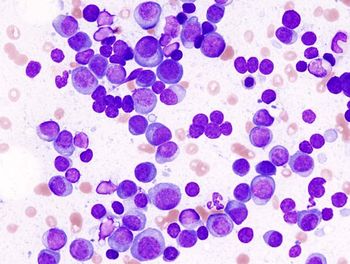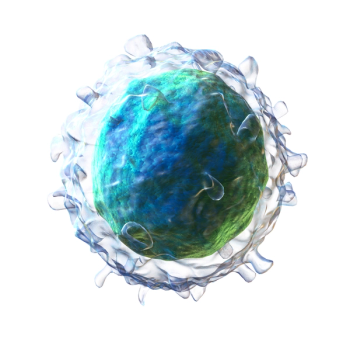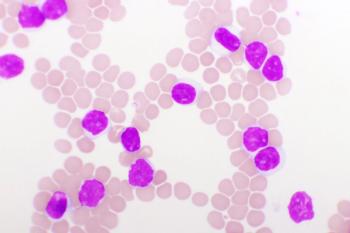
Adding abiraterone acetate and prednisone to androgen-deprivation therapy and docetaxel improved radiographic progression-free survival for men with de novo metastatic castration-sensitive prostate cancer.

Your AI-Trained Oncology Knowledge Connection!


Adding abiraterone acetate and prednisone to androgen-deprivation therapy and docetaxel improved radiographic progression-free survival for men with de novo metastatic castration-sensitive prostate cancer.

Subcutaneous Elranatamab had high response rates when given at or above 215 μg/kg.

Reck mentioned the IMpower010 and CheckMate 816 trials investigating treatment options for patients with non-small cell lung cancer.

A post hoc analysis of the CLEAR trial shows that patients may derive an overall survival benefit with lenvatinib plus everolimus versus sunitinib for frontline treatment of RCC, with efficacy ongoing.

Despite failure to reach the primary end point of statistically significant overall survival benefit, TAK-700 plus androgen-deprivation therapy for metastatic hormone-sensitive prostate cancer may be a valid treatment option for some patients.

Larotrectinib’s tumor-agnostic indication for NTRK fusion–positive cancers is further validated by data presented at the 2021 ASCO Annual Meeting.

CancerNetwork® sat down with Matthew D. Galsky, MD, at the 2021 ASCO Annual Meeting to discuss his thoughts on research he believes has the greatest potential to impact standard of care treatment of bladder cancer.

Data from the MonumentTAL-1 trial detailed the benefits with the recommended phase II dose of talquetamab to treat patients with relapsed/refractory multiple myeloma.

Pimitespib significantly improved progression-free survival while prolonging overall survival compared with placebo to treat patients with advanced gastrointestinal stromal tumor.

Disparities regarding comprehensive genomic profiling came to light during a presentation at the 2021 ASCO Annual Meeting.

Treatment with the off-the-shelf, full-size BCMA X CD3 bi-specific antibody appeared well tolerated with promising efficacy among patients with relapsed/refractory multiple myeloma.

As a bladder-sparing treatment strategy, transurethral resection of the bladder tumor with nivolumab and chemotherapy showed promise for patients with muscle-invasive bladder cancer.

The investigational BCMA-directed CAR T-cell therapy sustained durable responses for heavily pretreated patients with relapsed/refractory multiple myeloma.

CAR066, showed a favorable safety profile and promising efficacy in the treatment of adult patients with relapsed/refractory B-cell non-Hodgkin lymphoma who failed prior CD19 CAR T-cell therapy.

Compared to upfront autologous stem cell transplantation for newly diagnosed, transplant-eligible patients with multiple myeloma, carfilzomib consolidation with cyclophosphamide and dexamethasone produced noninferior results.

For men with asymptomatic or mildly symptomatic mCRPC, using bone-protecting agents during treatment with radium-223 plus enzalutamide controlled the risk for fractures.

In line with responses seen at the primary analysis, final results of a phase 2 trial support activity of trastuzumab deruxtecan in HER2-positive metastatic CRC.

Adding panitumumab to 5-FU and leucovorin significantly improved PFS compared with 5-FU/leucovorin alone as a maintenance therapy for patients with RAS wild-type metastatic CRC.

Pembrolizumab plus gemcitabine and concurrent hypofractionated radiotherapy to treat patients with MIBC demonstrated safety and efficacy.

Patients with metastatic TNBC treated with sacituzumab govitecan maintained an efficacy benefit compared with physician's choice chemotherapy.

Responses to selpercatinib in patients with pretreated medullary thyroid cancer were noted irrespective of therapy regimens received in prior lines, according to data from the 2021 ASCO Annual Meeting.

Look back at some of the important news and notes from last week you might have missed in the world of oncology from the 2021 ASCO Annual Meeting, the FDA, and the journal ONCOLOGY®.

CancerNetwork® spoke with 2 experts to learn more about focal therapy and its role in treating localized prostate cancer moving forward.

Certain patients with RAS wild-type colorectal cancer should be treated with bevacizumab in place of cetuximab in combination with FOLFOXIRI.

Clinical activity of the combination of pertuzumab and trastuzumab in seen in patients with ERBB2/ERBB3 overexpressing uterine cancers.

The combination treatment produced complete responses in more than half of the patients included in the phase 2 CAPTIVATE study.

CancerNetwork® sat down with Matthew D. Galsky, MD, at the 2021 ASCO Annual Meeting to talk about data from a phase 2 trial examining the use of neoadjuvant nivolumab plus gemcitabine/cisplatin prior to bladder-sparing surgery.

As frontline therapy, pembrolizumab plus axitinib led to a statistically significant survival benefit over standard-of-care therapy, according to data presented at the 2021 ASCO Annual Meeting.

Some improvement in pathological complete response may be possible with SD-101 plus pembrolizumab and paclitaxel in certain patients with HER2-negative breast cancer, but results are still uncertain.

Doubling treatment duration of bevacizumab did not lead to better survival in patients with ovarian cancer who were treated on a phase 3 trial.